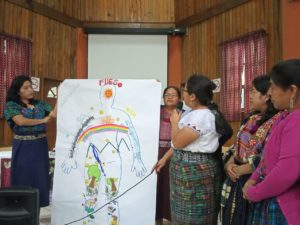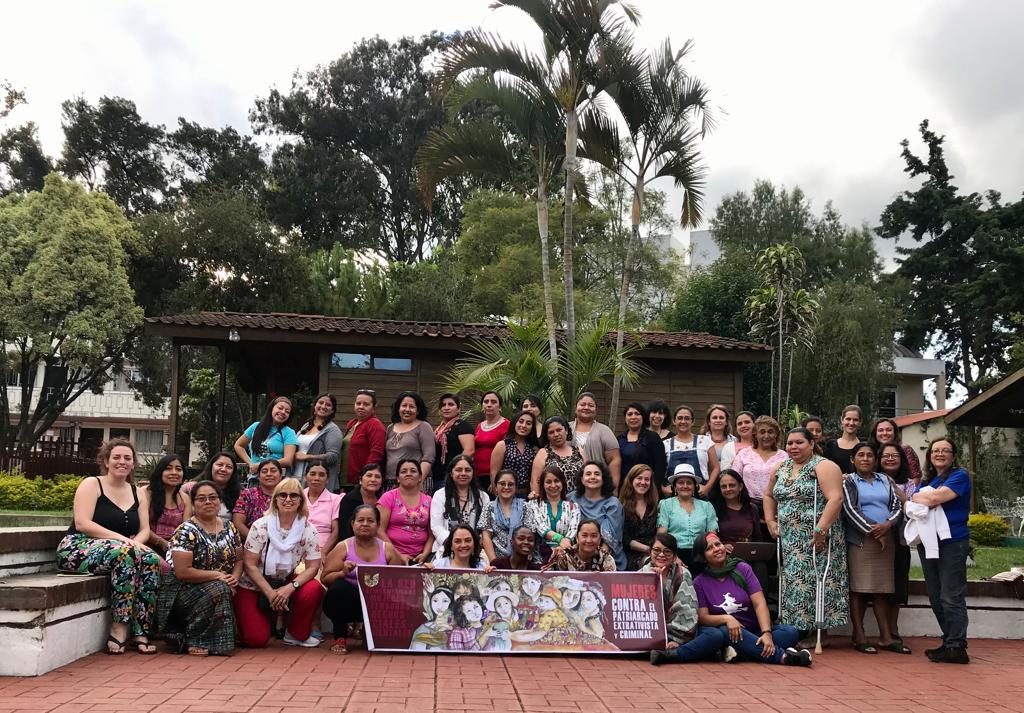Acerca de la X asamblea de la red latinoamericana de mujeres defensoras de derechos sociales y ambientales

(translation in English below)
Guatemala fue sede de la X Asamblea de la Red Latinoamericana de Mujeres Defensoras de Derechos Sociales y Ambientales (13 al 17 de noviembre de 2019) de en la que participaron mujeres y organizaciones de mujeres de Centro y Sur América, Asía y África, para intercambiar experiencias de luchas por la imposición de industrias extractivas en sus territorios.
Las participantes compartieron sus experiencias: sobre como las transnacionales violentan la vida de las mujeres, el acoso, la persecución política. Mujeres que han tenido que irse al exilio por defender el territorio y la vida a la vez compartieron como las empresas transnacionales extractivas violentan la vida comunitaria y fomentan la división para implementar sus proyectos extractivistas.
En el encuentro se tuvo un espacio espiritual. Las mujeres mayas compartieron con las demás mujeres y desde la cosmovisión maya, al rededor del fuego, recordamos a las mujeres que han dado sus vidas en la lucha por defender la vida (sean mujeres asesinadas o encarceladas) y por la salud de mujeres luchadoras que enfrentan enfermedades. En este espacio se pidió por la salud de una compañera muy querida de Ecuador quien ha luchado fuertemente por la defensa de los derechos de las mujeres.
En Guatemala también tuvo lugar el TRIBUNAL DE PUEBLOS, espacio en el que las mujeres presentaron casos de vivencia de persecución, criminalización, y como viven las mujeres defensoras de derechos sociales y ambientales. Además de la criminalización de las transnacionales, muchas veces las mujeres enfrentan otros tipos de agresiones que no precisamente venga de las transnacionales específicamente sino del sistema capitalista patriarcal instalada en la sociedad.
De manera general creo necesario seguir luchando contra las violaciones de derechos de parte de las transnacionales, además de ello es necesario la formación dentro de las organizaciones sociales para eliminar cualquier forma de violencia contra de las mujeres, realizado de forma consciente o inconscientemente por los propios defensores contra defensoras de derechos humanos.
En el tema de acceso a la justicia para mujeres, es difícil tomando en cuenta que los jueces tienen una visión occidental y no están preparados para atender casos de personas de pueblos originarios. El caso de Guatemala demuestra como los jueces no hablan idiomas mayas. Aunque en algunos casos se contratan intérpretes, no es lo mismo si hubiera una inmediación directa entre la o el imputado/acusado con el juez.
La cooptación del sistema de justicia por intereses económicos transnacionales es fuerte, por lo que muchos defensores y defensoras están presos injustamente por defender la vida.

On the X Assembly of the Latin American Network of Women Defenders of Social and Environmental Rights
Guatemala hosted the X Assembly of the Latin American Network of Women Defenders of Social and Environmental Rights (November 13-17, 2019) in which women and women’s organizations from Central and South America, Asia, and Africa participated to exchange experiences of struggles due to the imposition of extractive industries in their territories.
Participants shared their experiences on: how transnational corporations violate women’s lives, harassment, political persecution. Women who have had to go into exile for their defense of the territory and life at the same time shared how transnational extractive companies violate community life and foster division to implement their extractive projects.
At the gathering, there was a spiritual space. Mayan women shared with the other women and from the Mayan worldview, around the fire, we remembered the women who have given their lives in the fight to defend life (whether they were murdered or are imprisoned) as well as those who are currently facing health issues. In this space, we appealed for the health of a very dear colleague from Ecuador who has fought hard for the defense of women’s rights.
In Guatemala, we also held the PEOPLES TRIBUNAL, a space in which women presented cases of persecution, criminalization, and how women defenders of social and environmental rights live. In addition to the criminalization from the part of transnational corporations, women often face other types of aggressions that do not precisely come from transnational corporations specifically but from the patriarchal capitalist system installed in society.
In general, I think it is necessary to continue fighting against the violations of rights by transnational corporations, in addition to that, training within social organizations is necessary to eliminate any form of violence against women, carried out consciously or unconsciously by human rights defenders themselves.
On the issue of access to justice for women, it is difficult considering that the judges have a Western vision and are not prepared to deal with cases brought fort by Indigenous peoples. For example, in Guatemala, judges do not speak Mayan languages. Even if in some cases interpreters are hired, it is not the same as when there is a direct means of communication between the plaintiffs/defendants and the judge.
The co-optation of the justice system by transnational economic interests is strong, so many defenders are unjustly imprisoned for defending life.
Written by Natalia Atz Sunuc. She is a Maya Kaqchikel human rights defender from Chimaltenago, Guatemala.



